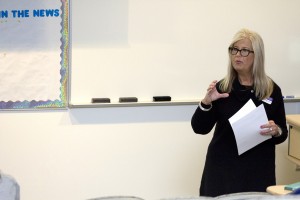By Audrey Werth/tr news editor
TCC provides learning needed for nursing careers, former students say
TCC nursing graduate Jill Whitfield was impressed by the diversity of students in the program. It helped students become better nurses, she said.
“The program is highly sought after for enrollment by a diverse group of applicants,” nursing associate professor Nancy Kupper said.

Photo by Bogdan Sierra Miranda/The Collegian
Other graduates agree the program prepared them well to continue their education in nursing and begin working in the field.
“I could just stand on the rooftop and extol the benefits of an associate degree in nursing,” Tarleton director of health and service related professions Sandi McDermott said. “I am incredibly proud to be able to tell people that I was an ADN-prepared nurse and that I went to TCC.”
During their time at TCC, students have clinical experiences that allow them to work in local hospitals.
“Clinicals form relationships,” Kupper said. “We tell students to consider that they are being interviewed by a potential future employer while they are having their clinical experiences.”
Graduates Tonya Hamilton, Annette Jacobs, Whitfield and McDermott all agreed they received a good foundation from the TCC nursing program.
“I think hospitals are very interested in TCC nursing students,” McDermott said. “They want to be sure that those students are going on to continue their education. It is a great start, but you cannot stop there, you have to keep going.”
Whitfield and Jacobs are currently working on their bachelor’s degrees through a bridge program that allows them to work in hospitals while finishing their degree online.
Hospitals have been urged by the Institute of Medicine to ensure that 80 percent of their nurses have a bachelor’s degree by 2020.
“We had to sign a contract at my facility when I got hired on that we would have a BSN within three years,” Jacobs said, “but what is so great is we are so prepared to do that coming out of TCC.”
Jacobs said she realized how well prepared TCC students were after speaking with others in the nursing profession.
“Employers really consider us to be so well prepared even though they do generally want applicants to have a BSN,” she said.
Tonya Hamilton graduated from the nursing program three years ago. Now, she works at Parkland Hospital in Dallas.
“Parkland is well known for its educational programs — a lot of nurses go there,” she said.
Hamilton said nurses are interested in Parkland because they know they will enter a variety of situations because of the patients they see there.
“You have a lot of opportunities there that you wouldn’t have at other hospitals,” she said.
Before she began working, she went through their ICU residency program.
“The program is like nursing school,” she said. “You go through it all again, but it’s very compressed, and then you get to start.”
Hamilton was hired to work in the neurological ICU. To prepare, she had to go through several trainings.
“Neuro wasn’t of particular interest to me, but now that I work in it, I find it so much more interesting,” she said.
McDermott said the clinical experience was important in deciding what kind of nursing she wanted to do.
Like Hamilton, the field McDermott got her first job working in hadn’t been the area she expected to go into.
Trauma hadn’t been of particular interest to her until she completed a clinical experience in a trauma unit at Harris Methodist.
“I just fell in love with that kind of nursing and the people in that unit,” she said.
After graduating, she applied for and got a position as a graduate nurse in that same unit.
“I think that speaks very well to the clinicals experience,” McDermott said. “It prepared me very well for my nursing career.”
Nursing graduates agree nursing school and a career as a nurse are challenging, but nursing has the potential to be rewarding if they go in with the right mindset.
“You have to have the right mix of intelligence, passion and bullheadedness,” Jacobs said. “You just have to be a strong person to be a nurse.”
Jacobs, who has run marathons, said nursing school was the most difficult training she has been through.
Hamilton, like Jacobs and Whitfield, was a nontraditional student. She decided to make nursing her second career after getting burned out in her previous job.
“It’s incredibly challenging mentally, emotionally and physically,” she said.
Hamilton decided to go into nursing because of positive experiences she had with nurses.
“I had my daughter when I was 25,” she said. “It was a very long, hard labor. I definitely learned that nurses could make or break your experience.”
Years later, her dad went into hospice care and ended up with a great care nurse.
“It inspired me that I could make that kind of impact on someone’s life,” she said.
She knew going into nursing that the field was going to be difficult, but it turned out to be even more challenging than she had imagined.
“It’s not really something you can prepare yourself for, but it’s also really rewarding, so hopefully you are going into it for the right reasons,” she said.
























